May 19, 2024 | 00:40 GMT +7
May 19, 2024 | 00:40 GMT +7
Hotline: 0913.378.918
May 19, 2024 | 00:40 GMT +7
Hotline: 0913.378.918
Going for the first time nearly 120km by motorbike from Son La city to Sop Cop district, a land that was previously likened to "a place where a bird cannot fly to its destination even when its head has turned white", I imagined it to be a trip full of hardship. All information I have about Sop Cop concluded that this is just a district with extremely difficult conditions.
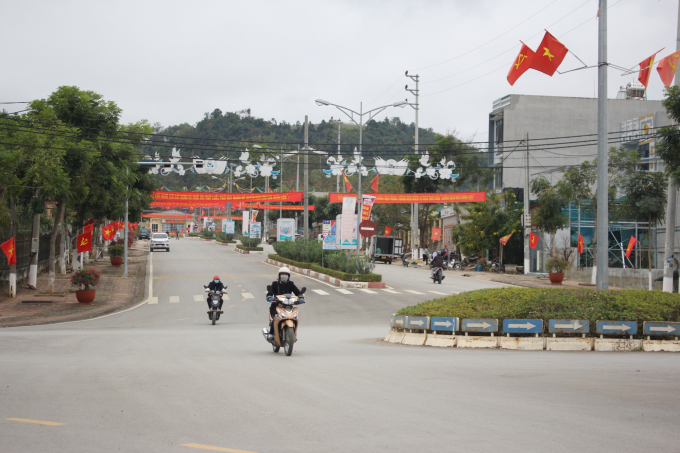
Sop Cop district center is developing more and more, taking the appearance of a small urban town. Photo: Trung Quan.
Arriving in Sop Cop, what lay in front of my eyes is the complete opposite: The district center, slowly showing its presence within the mist, takes the appearance of a small urban town. The face of life of many people in remote areas in Sop Cop has remarkably changed.
During 2012 and 2013, Sop Cop district People's Committee coordinated with businesses to support people in implementing coffee growing projects in the district.
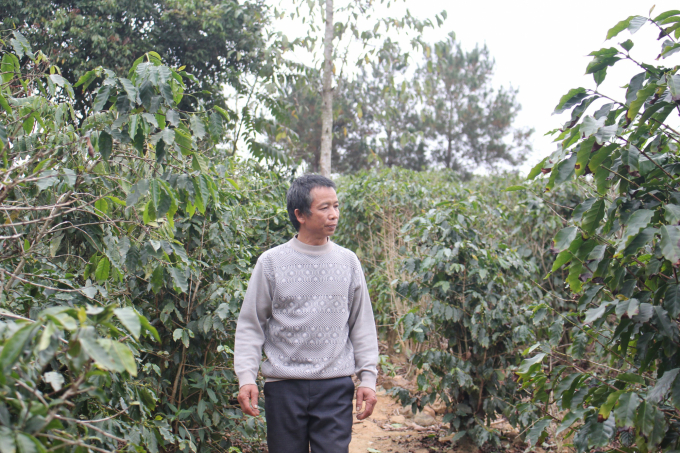
Coffee has transformed the once “life of poverty” of many people in remote areas in Sop Cop. Photo: Trung Quan.
Mr. Vi Van Ngoan, Head of Pac Phay village (Dom Cang commune, Sop Cop) said that people in Dom Cang used to make ends meet through maize, cassavas and potatoes only. Having a solid house and a motorbike was already a dream big enough.
"At first the district brought the coffee growing project back to the village, ready to implement with policies to support seedlings, fertilizers, and techniques, but most people were skeptical and refused to participate. They have never planted long-term crop, the efficiency is unknown, not to mention having to spend time learning the technique," said Mr. Ngoan.
Refusing to give up, he and the local officers decided to make an example by pioneering to plant first. Mr. Ngoan’s family converted 1 ha of corn and cassava to coffee, which gathered much higher economic efficiency after harvested. The good news then spread far and long. People in the village and in the commune also gradually came and asked to learn about coffee growing techniques.
By 2021, all 184 households in Phat Phay village grew coffee with a total area of more than 230 ha. The selling price of dry coffee is VND 70,000 - 75,000/kg, Each household’s average income is VND 150 - 700 million.
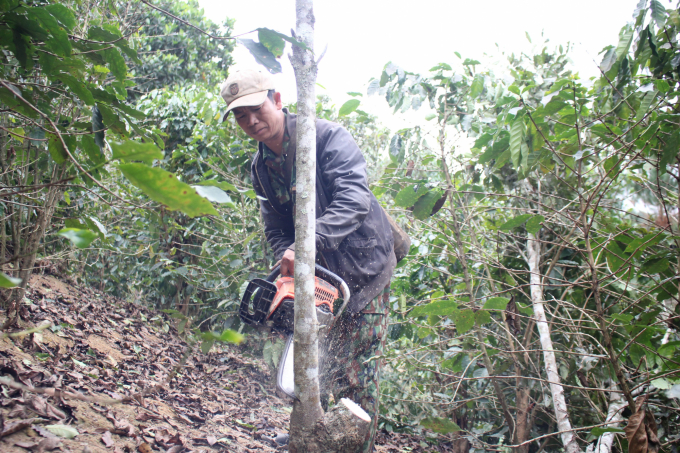
Coffee growers in Sop Cop renovating their gardens and preparing for a new crop. Photo: Trung Quan.
Thanks to the coffee tree, dreams that once seemed far away are now a reality. The sight of officers having to go to every alley, knocking door to door to encourage people to grow coffee appears no longer. Seeds are always ready. Every unused land fund means an increase in planting areas. Many households have now sustainably escaped poverty.
In recent years Sop Cop has strongly transformed its plant structure from low production value crops to perennial crops and fruit trees of high economic value.
The district has formed many specialized farming and production areas: Muong glutinous rice production areas; the concentrated fruit trees areas in Muong Va, Nam Lanh and Muong Lan communes; and the coffee growing area in Dom Cang commune. These specialized areas help households earn tens to hundreds of millions of Vietnamese dong per year.
Coffee in Sop Cop has the signature flavor of Son La coffee tree, gaining great favor in both domestic and foreign markets. Many traders and businesses seek to purchase and raise the topic of building material areas.
Since the National Highway 4G connects directly to the district center, trade activities with other districts and provinces have also become more bustling. Sop Cop's agricultural potential also undergoes great transformation. Many enterprises come with great investment, aiming to have it unlocked.
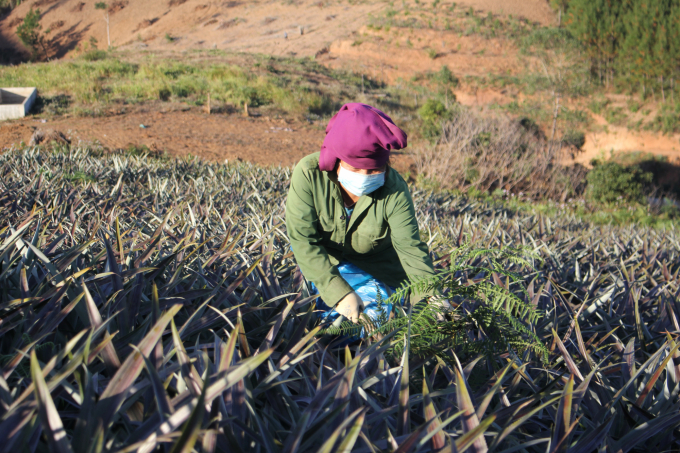
Members of Nam Phuong Agricultural Cooperative, in association with DOVECO, take care of raw pineapple areas. Photo: Trung Quan.
Dong Giao Foodstuff Export Joint Stock Company (DOVECO) has launched an investment program since 2020, creating connections with many cooperatives in Sop Cop to develop pineapple material areas.
Nam Phuong Agricultural Cooperative in Ban village, Sop Cop commune is the first cooperative in the district to associate with DOVECO and plant pineapple.
The cooperative was selected by Sop Cop district to pilot plant pineapple material in a 5 ha area. The District People's Committee has invested over VND 8 billion to support pineapple farmers in terms of seeds, fertilizers, and plastic tarpaulin. At the same time, Sop Cop People's Committee directed the Agricultural Service Center to organize training, guidance, and transfer pineapple planting and care techniques to the locals.
DOVECO assessed that Sop Cop’s soil and climate are very suitable for pineapple trees, resulting in the potential to "replace" tens of thousands of hectares of cassava in this district. The company aims to expand the concentrated pineapple raw material area.
Translated by Samuel Pham
/2024/05/17/5720-1-134847_782.jpg)
(VAN) EcoTraceTech - System for measuring CO2 and CH4 emissions from rice plants is the startup idea of a group of Can Tho University students.
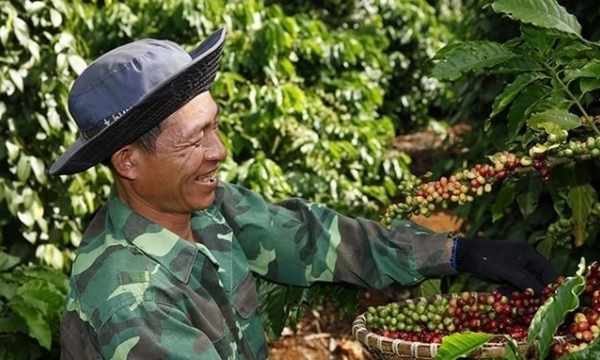
(VAN) The NESCAFÉ Plan by Nestlé Vietnam in the Central Highlands together with MARD aims to support coffee farmers in regenerative agriculture.
/2024/05/16/4437-1-223910_491.jpg)
(VAN) The Community Food Garden model is one of the outstanding activities and models of green transformation in the world as well as in Vietnam.
/2024/05/16/2455-1-111202_165.jpg)
(VAN) Artemia eggs originating in Vinh Chau (Bac Lieu) are assessed by customers to have the best quality in the world; however, domestic production output only accounts for 1%.
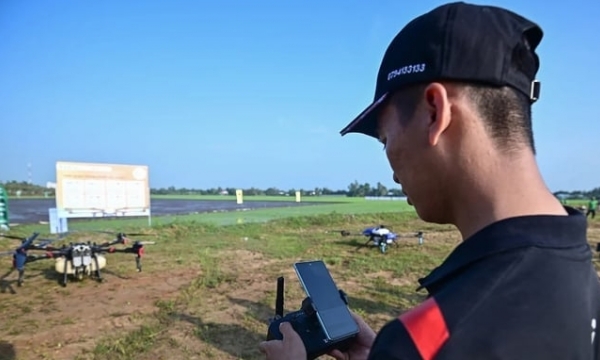
(VAN) Deputy Permanent Chairman of the National Committee for Digital Transformation Tran Luu Quang chaired the symposium on 'Promoting digital transformation of agriculture,' held on May 14.
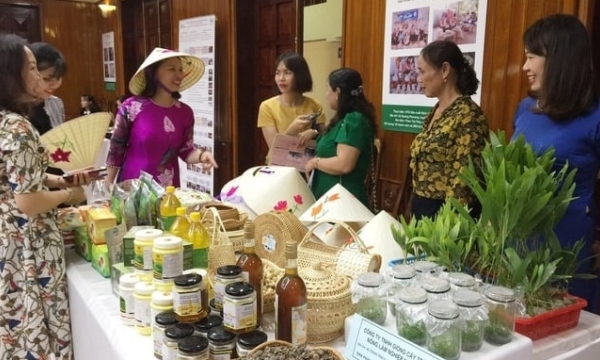
(VAN) After seven years of implementation, the Commercial Smallholder Support Project (CSSP) successfully aided numerous local households in escaping poverty, with multiple infrastructure projects initiated across Bac Kan province.
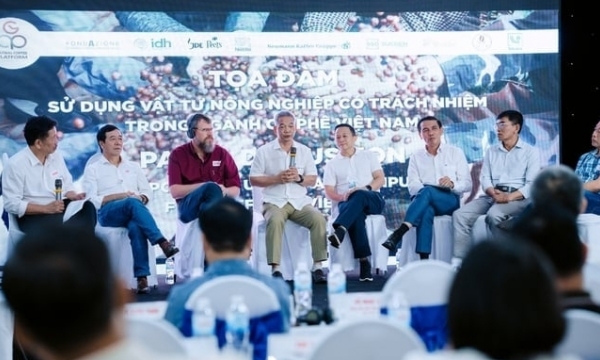
(VAN) The Global Coffee Platform (GCP) recently hosted a multi-stakeholder panel discussion on responsible use of agro-inputs in coffee production in Vietnam